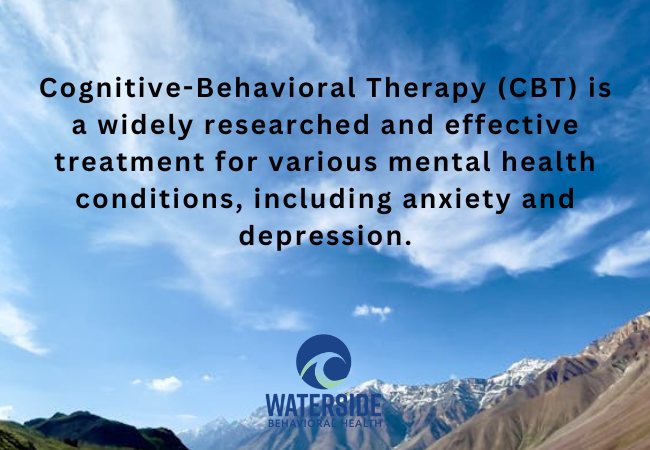Cognitive-Behavioral Therapy (CBT) is one of the most widely used evidence-based psychotherapy approaches for treating various mental health conditions, including anxiety, depression, trauma, and stress-related disorders. Unlike traditional talk therapy, CBT is a structured, goal-oriented treatment that focuses on identifying and modifying negative thought patterns and behaviors to promote lasting emotional well-being.
At Waterside Behavioral Health, we specialize in Cognitive-Behavioral Therapy in Massachusetts as part of our mental health treatment programs in Massachusetts. Whether you’re struggling with anxiety, depression, or trauma-related disorders, CBT can provide you with practical coping strategies to regain control over your thoughts, emotions, and behaviors.
This comprehensive guide will explore:
- How CBT works
- Why it is effective
- Who can benefit from it
- How it compares to other forms of therapy
- The role of CBT in combination with medication
What Is Cognitive-Behavioral Therapy (CBT)?
CBT is a structured, short-term psychotherapy approach that helps individuals recognize and change distorted thought patterns, negative emotions, and harmful behaviors. Developed by Dr. Aaron Beck in the 1960s, CBT is based on the idea that thoughts, feelings, and behaviors are interconnected—meaning that changing negative thoughts can lead to healthier emotions and behaviors.
Unlike other therapy approaches that focus extensively on past experiences, CBT emphasizes the present and future, equipping individuals with practical tools to address their current struggles.
How Cognitive-Behavioral Therapy Works
1. Identifying Negative Thought Patterns
The first step in CBT is recognizing automatic negative thoughts (ANTs) that contribute to distress. These thoughts are often irrational, exaggerated, or self-defeating.
Examples of Negative Thought Patterns:
- Catastrophizing: “If I fail this job interview, my entire career is ruined.”
- All-or-Nothing Thinking: “If I’m not perfect, I’m a complete failure.”
- Mind Reading: “Everyone at the party thinks I’m awkward.”
- Overgeneralization: “I always mess things up, so I’ll never succeed.”
2. Challenging and Reframing Thoughts
Once negative thoughts are identified, a CBT therapist helps individuals challenge and reframe them by assessing their accuracy and developing healthier, more realistic perspectives.
Example:
- Before CBT: “I made a mistake at work, so my boss must think I’m incompetent.”
- After CBT: “Everyone makes mistakes. One mistake does not define my abilities. I can learn from this and improve.”
3. Behavioral Activation and Exposure Therapy
CBT also focuses on changing behaviors that reinforce anxiety, depression, or fear-based responses.
- For Anxiety Disorders: Exposure therapy helps individuals gradually confront fears in a safe and controlled environment.
- For Depression: Behavioral activation encourages individuals to engage in positive activities, even when they lack motivation.
4. Learning and Practicing Coping Strategies
CBT equips individuals with practical coping techniques to manage stress and regulate emotions, including:
- Relaxation techniques (deep breathing, progressive muscle relaxation)
- Mindfulness and meditation to reduce anxiety
- Problem-solving strategies to navigate challenging situations
- Assertiveness training for social anxiety
5. Homework Assignments for Reinforcement
CBT is an interactive therapy that requires individuals to apply learned strategies outside of sessions. Therapists often assign homework such as:
- Keeping a thought journal to track negative thoughts and reframe them
- Practicing exposure exercises to confront fears
- Engaging in self-care activities to improve mood
Why Is Cognitive-Behavioral Therapy Effective?
CBT is one of the most researched and scientifically backed therapies for mental health treatment. Here’s why it is so effective:
1. CBT Is Evidence-Based and Scientifically Proven
- Research shows that CBT is as effective as medication for many anxiety and depression cases.
- Studies indicate that CBT reduces symptoms long-term, preventing relapse.
2. CBT Provides Lasting Benefits
Unlike medication, which only manages symptoms, CBT teaches lifelong skills that empower individuals to manage their mental health independently.
3. CBT Is Structured and Goal-Oriented
- Therapy typically lasts 8 to 20 sessions, focusing on specific goals.
- The structured format ensures measurable progress.
4. CBT Can Be Combined with Other Therapies
CBT can be integrated with:
- Dialectical Behavior Therapy in Massachusetts (DBT) for individuals with severe emotional dysregulation.
- Trauma Therapy in Massachusetts for PTSD and past emotional wounds.
- Medication management for cases where additional support is needed.
Who Can Benefit from Cognitive-Behavioral Therapy?
CBT is highly effective for a wide range of mental health conditions, including:
1. Anxiety Disorders
CBT is widely used for anxiety treatment in Massachusetts, including:
- Generalized Anxiety Disorder (GAD)
- Social Anxiety Disorder
- Panic Disorder
- Phobias
2. Depression
CBT is the leading approach for depression therapy in Massachusetts, helping individuals overcome negative thoughts and regain motivation.
3. Trauma and PTSD
For individuals with trauma-related anxiety, CBT techniques like exposure therapy and cognitive restructuring help process traumatic memories.
4. Obsessive-Compulsive Disorder (OCD)
Exposure and Response Prevention (ERP), a specialized form of CBT, helps individuals manage compulsions and intrusive thoughts.
5. Stress and Relationship Issues
CBT can help individuals manage stress, anger, interpersonal conflicts, and unhealthy relationship patterns.

CBT vs. Other Forms of Therapy
CBT vs. Dialectical Behavior Therapy (DBT)
- CBT focuses on changing negative thoughts and behaviors.
- DBT emphasizes emotional regulation, mindfulness, and distress tolerance, making it ideal for individuals with intense emotional reactions.
CBT vs. Trauma Therapy
- CBT helps reframe negative thoughts from trauma.
- Trauma Therapy (EMDR, Exposure Therapy) focuses on processing traumatic memories directly.
CBT vs. Psychodynamic Therapy
- CBT is solution-focused and time-limited (short-term therapy).
- Psychodynamic therapy explores unconscious processes and past experiences (long-term therapy).
Take the First Step Toward Healing with CBT
If you or a loved one is struggling with anxiety, depression, or trauma, Cognitive-Behavioral Therapy can help you regain control over your thoughts and emotions. At Waterside Behavioral Health, we offer:
- Personalized CBT sessions tailored to your needs
- Comprehensive mental health treatment programs in Massachusetts
- A compassionate, experienced team of therapists
Call Waterside Behavioral Health today at 774.619.7750 to learn more about Cognitive-Behavioral Therapy in Massachusetts and schedule a consultation.
FAQ About Cognitive-Behavioral Therapy (CBT)
What is Cognitive-Behavioral Therapy (CBT)?
CBT is an evidence-based psychotherapy that helps individuals identify and change negative thought patterns and behaviors that contribute to anxiety, depression, and trauma.
How does CBT work?
CBT focuses on recognizing automatic negative thoughts, challenging their accuracy, and replacing them with more balanced perspectives. It also includes behavioral techniques to help individuals face fears and improve coping skills.
What mental health conditions does CBT treat?
CBT is effective for:
- Anxiety disorders (generalized anxiety, panic disorder, social anxiety, phobias)
- Depression
- Post-traumatic stress disorder (PTSD)
- Obsessive-compulsive disorder (OCD)
- Stress and relationship issues
How long does CBT treatment take?
CBT is typically short-term, lasting 8 to 20 sessions, depending on individual needs.
How effective is CBT compared to medication?
Studies show that CBT is as effective as medication for anxiety and depression, and it provides long-term benefits by equipping individuals with lifelong coping skills.
Can CBT be combined with other therapies?
Yes! CBT can be combined with:
- Dialectical Behavior Therapy (DBT) for emotional regulation.
- Trauma Therapy for PTSD and past emotional wounds.
- Medication management, when necessary.
Is CBT the right treatment for me?
If you struggle with persistent negative thoughts, overwhelming anxiety, or difficulty coping with stress, CBT can provide practical tools to regain control of your mental health.




